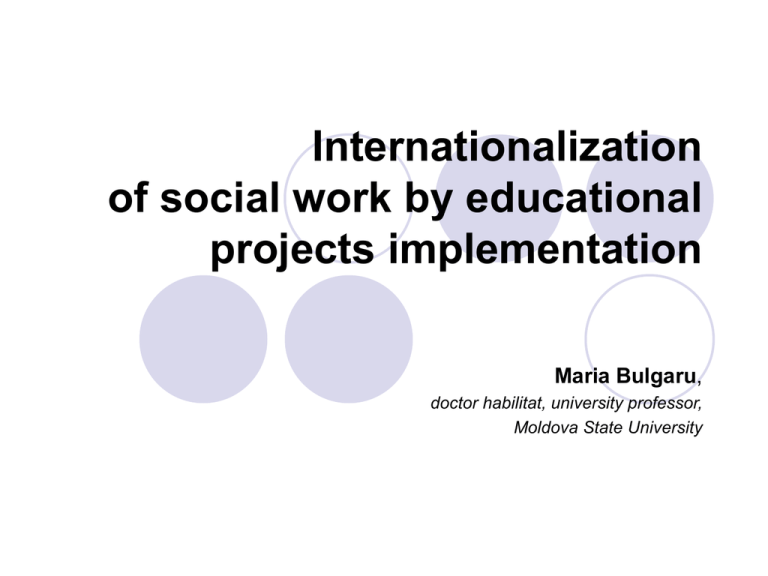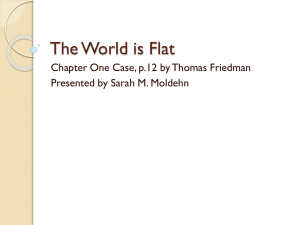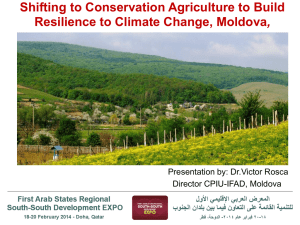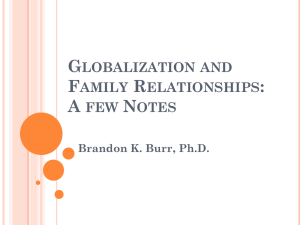
Internationalization
of social work by educational
projects implementation
Maria Bulgaru,
doctor habilitat, university professor,
Moldova State University
1. Social work and globalization
Social work systems are working in the conditions of the intense
development of globalization processes, characterized by
fundamental changes in the economy, division of labor market, new
information and communication technologies, etc., and also by the
significant increase of peoples interdependence, wherever they are
be located.
Globalization is a reality that affects all societies and their domains,
including welfare systems and practices of social workers.
In these circumstances, social workers must be prepared,
considering local, community and their own country’s requirements,
to activate in an interdependent world, which, undoubtedly,
generates the need for them to review their knowledge and practice
through the international events and perspectives.
So, it is the time to redefine the mission and forms of social work
and professional education to become these relevant in the new
globalizing conditions. [K.Lyons]
2. International social work
International social work, according to Lynne Healy, is a complex and
multidimensional concept that includes global social problems, comparative
analysis, international practices, specialized intergovernmental relations,
standards and global vision etc.
An important step in promoting social work as a profession with an international
dimension, able to meet the challenges of globalization, is related to the creation
of “Global Standards for the Education and Training of the Social Work
Profession”, adopted at the common Congress of IFSW and IASSW (October
2004, Adelaide).
The main goal of "Global Standards ..." is to reflect the ideals to which schools
of social work should tend to ensure a high intellectual level of education in this
field, to enhance the education and practice of social workers at global level
through the development of inter-national and inter-regional practices”.
The definition of social work as a profession with international dimensions is
formulated by the “Global Standards for the Education and Training of the Social
Work Profession”: „The social work profession promotes social change,
problem solving in human relationships and the empowerment and
liberation of people to enhance well-being. Utilizing theories of human
behavior and social systems, social work intervenes at the points where
people interact with their environments. Principles of human rights and
social justice are fundamental to social work”.
3. Relevant global problems for
international social work
Among the most relevant global problems for international social
work are:
poverty;
social and economic inequality, huge differences between rich and
poor, both within countries and as well as between them;
natural disasters, and those that are “man-made”;
migration processes;
discrimination by sex, race, ethnicity, class and religion etc.;
“population ageing”;
the increase of human trafficking;
increase of the drug trafficking and of the number of dependent
persons;
the expansion of diseases with global dimensions (HIV/ AIDS), etc.
Of course, the listed above problems can be completed with others, all
of them intensifying the need for collaboration, integration of social
work professionals in the various aspects and thereby contributing to
the development of a comprehensive / international social work.
4. The role of educational projects in the development of
international dimensions of social work
Changes arising from globalization processes require, at
the same time, need to increase the knowledge of social
workers about the impact of these changes on people's
lives, about the practices of international welfare, on
innovative strategies to solve existing social problems
and prevent the emergence of the new ones etc., and
ability to use them in concretely socio-cultural situations.
A significant role in shaping the skills needed to meet
global challenges and in developing international
dimensions of social work belongs to the social work
education.
A great potential in the development and
internationalization of social work education is contained
in the international projects, focused on the collaboration
of universities in the field of specialists’ formation.
5. The Tempus projects impact on the social work
profession development (the case of MSU)
Resources, accumulated by the Department of Social Work during the last 15 years,
have been formed with the significant contribution of the international projects:
by means of these projects was accumulated a rich collection of specialty literature:
manuals, course materials, methodical works, monographs, purchased or elaborated
by faculty authors;
within the Faculty were opened several centers of professional training (Republican
Social Work Resources Center, Center of Excellence, Teaching and Learning Center,
Social Research Center) equipped with advanced technical means, which created the
possibility of quick connection to international informational bases, etc.;
international projects constitute an important mean that support the international
mobility of teachers and students;
A positive consequence of international projects nominated for social work education
in the Republic of Moldova is related to strengthening the cooperation capacity of the
country's academia with social services, with local public administration, NGOs, civil
society, to involvement in activities for social policies elaboration, etc.
The most important thing achieved at Faculty of Sociology and Social Work (FSAS)
by implementing projects is related to renewal of the curricula in accordance with
the recommendations of the Bologna Process and the requirements of labor
market, and as a result – is created the possibility of training social workers capable
to adapt easily to the new requirements at national and international plane.
6. New specializations opened through the
TEMPUS projects
The TEMPUS projects: “Child Rights Education Development − Moldova and
Serbia”, “Professionalisation of Social Work Education”, “Master
Programmes in Public Health and Social Services” have had a significant
role in the curriculum modernization.
Through the these TEMPUS projects were opened:
Two specializations/options at Licentiate (undergraduate) level (“Social
Work with Family and Child at Risk”, “Social Work with Elderly Persons”)
and three Master's programs (“Childhood Studies and Children's Rights”,
“Management of Social Services”, “Family-Centered Social Policies”).
The creation of these specialties was made on the basis of a thorough
analysis of necessities in the Republic of Moldova, labor market
requirements, in order to reduce the gap between the process of
formation/training social workers in higher education institutions and
problems which the contemporary society faces.
This is the first experience in the Republic of Moldova, when takes place the
change from generalist approach in the training of social workers to the
specialized preparation on domains, in accordance with the requirements of
the labor market.
7. The new courses introduced in the curricula
The curricula were essentially renovated and supplemented with new courses according to
new specializations/options, such as:
Social Policies: Comparative Perspective;
Diagnosis and Resolution of Social Problems;
Migration and Its Social Consequences;
Evolutions of Demographic Processes;
Social Gerontology,
Resolution of Social and Ethnic Conflicts;
Intercultural Communication;
Social Inclusion of Minority Groups;
Human Development;
Community Development,
Management of Projects (Human Resources, Social Services);
Family Health;
Social Work with Elderly Persons (with Discriminated, Trafficked, HIV/AIDS Infected,
Drug Addicted Persons);
Family Protection in the National and European Context etc.
The new courses introduced in the curricula reflect contemporary perspectives for
professionalisation of social work, being focused on practical skills training, that would
enable graduates to adapt to changing society and to involve themselves actively in the
solution of the arising problems.
8. Instead of conclusion
The theoretical
approaches of the
internationalization of
social work in the
conditions of
globalization you can
find in the my recent
published textbook
“Social Work in the
context of globalization”












